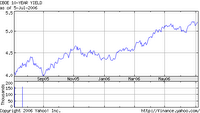
The Los Angeles Daily News has come out with a new article about California foreclosures increasing 104.4% from a year ago. Granted the foreclosure rates were abnormally low over the last couple years, but nevertheless, it is the trend I am following. Follow the link below:
http://www.dailynews.com/search/ci_4099727
These are dangerous numbers that are trending upward at a rapid pace. Here is a perfect example of a mercenary in the article:
"While the nation's foreclosure rate has certainly shifted into a higher gear since last year, low unemployment and home price appreciation in most housing markets have held foreclosures in check," Saccacio said in a statement.
The company forecasted a slowdown in foreclosure rates in its first quarter report and now expects that if the summer delivers its typically high number of home buyers, rates won't increase too rapidly.
This mercenary Saccacio is the CEO of RealtyTrac.com and guess where his interests are.... The spin that this fella tries to put on these horrible numbers is amazing. I think we already know what the summer has brought and that is less buyers and more inventory. Expect housing to continue its decline with a few hopeful bounces in the process. Unfortunately these bounces will only hurt more homeowners because it will give them the false reality of future increases.
A common question that I have come across is: "where do I get access to the foreclosure market" or "when is the best time to go after foreclosures?" Well my answer has been that you need to wait for a large sustained glut of foreclosure inventory. When I mean "sustained" it has to be at least 2yrs and when I mean "a glut of inventory" it needs to 5x larger then normal. Why? Well the reason people can make money on foreclosures is because the banks own the house. Banks are definitely not in the business of holding, buying, or selling property and will unload a house below a depressed market value. Right now house flippers and real estate "investors" have the foreclosure market relatively saturated because they see this as the next great thing. Go ahead and do a web search on foreclosures to get an idea of what I am saying. Remember in foreclosure auctions your buying the house as-is. There is some risk in this with termites, mold, foundation issues, etc that can make your new acquisition worthless.
Be forewarned!
Article Source: Los Angeles Daily News

